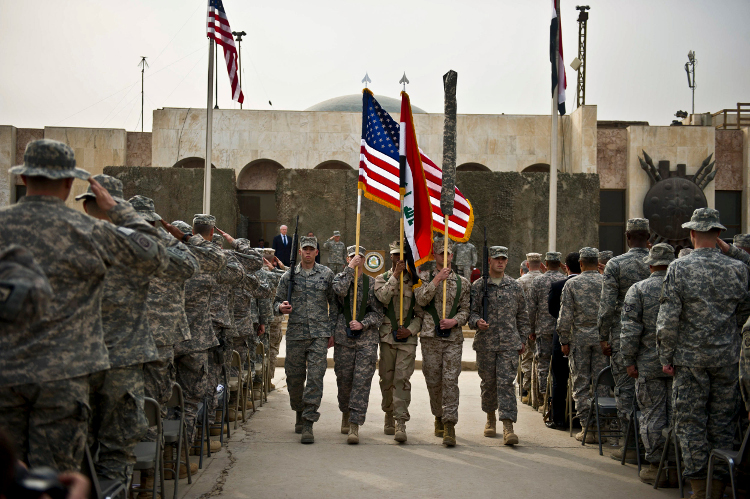It was more than three years ago when the last remaining US service members were withdrawn from Iraq, capping a devastating nine-year war that saw more than 4,000 Americans casualties and countless survivors suffering traumatic physical and psychological wounds.
As a war-weary American public is all-too aware, US troops have returned to Iraq to assist a seemingly dysfunctional Iraq army in what has now become a 10-month battle against the so-called Islamic State, also known as ISIS or ISIL.
The number of troops there grew last week when the Obama administration—following a request from Iraqi Prime Minister Haider al-Abadi—authorized the deployment of 450 US troops, bringing to 3,550 the total number of US soldiers in Iraq.
The administration’s decision to bolster the number of troops in the war-torn country follows troubling advances by ISIS, most notably its recent takeover of Ramadi, the capital of western Anbar Province. This time last year, ISIS routed the Iraqi army and claimed Mosul, which Iraqi security forces have failed to retake.
While troops were preparing to embark on another mission in Iraq, albeit in an advisory role, Congress was offered the opportunity to vote on an amendment added to a defense appropriations bill that would’ve forced lawmakers to authorize the war against ISIS. That amendment failed to pass.
For the last 10 months, the US has been fighting a war that has yet to be authorized by Congress, the only branch of government with the power to approve war.
The Obama administration has been relying on a pair of post-Sept. 11 war authorizations—the 2001 AUMF and 2002 AUMF—to justify its war on ISIS. The administration often evokes those versions to validate its borderless drone war and to explain why it had the authority to kill a US citizen-turned-radical cleric in Yemen. The 2001 AUMF, drafted in the days following Sept. 11, in particular has been blasted by civil liberty groups as overbroad. That version gave President George W. Bush the authority to defend the nation against the perpetrators of the terrorist attacks, meaning al Qaeda. ISIS didn’t exist then. And although it was born out of the terror network, al Qaeda has since disavowed the group, partly due to its brutality.
After Congress decided not to act in the months preceding the mid-term elections, the Obama administration proposed its own AUMF, which would remain in effect for three years.
Yet, as US Secretary of State John Kerry explained in one of the few debates on Obama’s war authorization, the administration doesn’t believe it needs Congress’ legal endorsement. The Obama AUMF is essentially a symbolic move to ostensibly show the international community that US lawmakers, the military, and the executive branch are united in the effort to “degrade and destroy” ISIS.
One day after Obama authorized the troop build-up, Congress was in session, debating a defense appropriations bill.
Rep. Adam Schiff (D-CA) proposed an amendment that would’ve required Congress to vote on war authorization by March 31, 2016. If Congress failed to do so, funding for the ISIS war would’ve halted immediately. The amendment failed by a 196-231 vote. Long Island’s Congressional delegation voted along party lines, with Rep. Kathleen Rice (D-Garden City), Rep. Gregory Meeks (D-St. Albans), and Rep. Steve Israel (D-Dix Hills) voting in favor of the amendment. LI’s GOP contingent, Rep. Peter King (R-Seaford) and Rep. Lee Zeldin (R-Shirley), voted no.
“If this is worth fighting ISIS, and I believe it is, it’s worth having Congress do its job,” Schiff said during his floor speech. “If we’re going to ask our service members to risk their lives, we ought to have the courage ourselves to take a vote on this war.”
Schiff accused Congress of being “derelict” and slammed his colleagues for abdicating their duties.
“During the course of that war, we have put our pilots and other service members at considerable risk and we have suffered casualties,” Schiff said. “We’ve expended hundreds of millions, if not billions of dollars. And as yet there is no end in sight to this conflict.”
I fear it will shift war-making powers substantially and inexorably towards the Executive. #AUMF
— Adam Schiff (@RepAdamSchiff) June 11, 2015
While this is another setback for a Congress long derelict in its duty, I will keep pushing for a debate and vote on a new #AUMF.
— Adam Schiff (@RepAdamSchiff) June 11, 2015
The lack of a clear strategic end-game was crystallized by the administration’s decision to bolster the US troop presence in Iraq, just as ISIS has claimed more territory.
In a conference call with reporters last week, a transcript of which was posted online, US officials asserted that the additional 450 troops would help train and “advise and assist” Iraqi security forces at Taqaddum military base in eastern Anbar Province. Troops will not be placed into ground combat, officials said.
“The intent of the additional site is to provide personnel to assist with planning, integration, logistics, and support to the Iraqi security forces and tribal forces as they fight to retake Ramadi and Fallujah, and ultimately all throughout Anbar,” said Elissa Slotkin, Assistant Secretary of Defense for International Security Affairs.
As more troops head overseas to assist the Iraqi army, US Congress remains non-committal with respect to authorizing the ISIS war.
US troops and the American people are left to wait and see if its elected lawmakers act on their oath to discharge the duties of their office.































